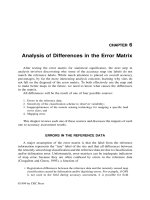Lecture Massage therapy review Passing the NCETMB, NCETM, and MBLEx (2e) Chapter 6 Laura A. Abbott
Bạn đang xem bản rút gọn của tài liệu. Xem và tải ngay bản đầy đủ của tài liệu tại đây (1.05 MB, 22 trang )
Massage Therapy Review:
Passing the NCETMB, NCETM, and MBLEx
Chapter 6
Professional Standards, Ethics, Business, and Legal
Practices
McGraw-Hill
© 2011 by The McGraw-Hill Companies, Inc. All rights reserved
6-2
Pre-class Assignment
• Review Chapter 6
of your Massage
Therapy Review
book
McGraw-Hill
© 2011 by The McGraw-Hill Companies, Inc. All rights reserved
National Certification Board for
Therapeutic Massage and Bodywork
Code of Ethics
• Sincere commitment
• Represent yourself
•
•
•
honestly
Accurately inform
clients
Know your limits,
contraindications,
scope of practice
Provide treatment to
client’s advantage
McGraw-Hill
6-3
• Continue to improve
•
•
•
•
yourself and your
knowledge
Be honest and
professional
Safeguard client’s
confidentiality
Use proper draping
Client and therapist have
right to refuse treatment
© 2011 by The McGraw-Hill Companies, Inc. All rights reserved
National Certification Board for
Therapeutic Massage and Bodywork
Code of Ethics, Cont’d
6-4
• Refrain from any and all sexual conduct, activities,
•
•
•
or behavior even if client attempts first
Respect client’s boundaries
Refuse gifts or benefits intended to influence
unjustly
Follow all policies, procedure, guidelines, etc., set
forth by NCBTMB
McGraw-Hill
© 2011 by The McGraw-Hill Companies, Inc. All rights reserved
6-5
Continuing Education
• 50 CEs every 4 years
– 2 CEs must be roles and
boundaries
– 4 CEs must be
business/ethics related
• See www.ncbtmb.org
McGraw-Hill
© 2011 by The McGraw-Hill Companies, Inc. All rights reserved
6-6
Professional Considerations
• Interviewing Techniques
– Intake forms
– Potential medical clearance
– Good listener
– Open-ended questions
McGraw-Hill
© 2011 by The McGraw-Hill Companies, Inc. All rights reserved
6-7
Professional Considerations,
Cont’d
• Communication
Techniques
– Verbal
– Non-verbal
McGraw-Hill
© 2011 by The McGraw-Hill Companies, Inc. All rights reserved
6-8
Verbal Skills
• Paraphrasing
• Client: “I’m concerned
– Restating what the
client said in order to
confirm
understanding
that I will be running
late today for my
appointment.”
• Therapist: “So, are you
thinking you will not
make it in time and
want to reschedule?”
© 2011 by The McGraw-Hill Companies, Inc. All rights reserved
McGraw-Hill
6-9
Verbal Skills, Cont’d
• Summarizing
– Consolidating all the
statements the client
has said to confirm
understanding
McGraw-Hill
• “In conclusion…”
• “So, to sum it up…”
• “Let’s review the
highlighted points…”
© 2011 by The McGraw-Hill Companies, Inc. All rights reserved
6-10
Verbal Skills, Cont’d
• Minimal Encouragers
– Brief words that let your
client know you are
listening and
encouraging the client to
continue
McGraw-Hill
• “aha…”
• “So, what happened
•
•
next?”
“I see.”
“hummm…”
© 2011 by The McGraw-Hill Companies, Inc. All rights reserved
6-11
Verbal Skills, Cont’d
• Probing
– An attempt to gain
more information.
– Trying to find out
what has not been
said.
McGraw-Hill
• “Let’s talk about that.”
• “What exactly do you
mean?”
© 2011 by The McGraw-Hill Companies, Inc. All rights reserved
6-12
Verbal Skills, Cont’d
• Clarifying
– An attempt to
understand what has
been said
McGraw-Hill
• “I’m confused about
what you are saying….”
© 2011 by The McGraw-Hill Companies, Inc. All rights reserved
6-13
Verbal Skills, Cont’d
• Confronting
• “It seems that you have
– Mild or strong
feedback when
dealing with a
situation that needs to
be corrected
McGraw-Hill
missed your last two
payments. Let’s sit
down and discuss a
solution that will work
for the both of us.”
© 2011 by The McGraw-Hill Companies, Inc. All rights reserved
6-14
Record Keeping
• Subjective
• Objective
• Assessment or
•
•
Application
Plan or Progression
HIPAA
– Health Insurance
Portability and
Accountability Act
McGraw-Hill
© 2011 by The McGraw-Hill Companies, Inc. All rights reserved
6-15
Planning Single and Multiple
Sessions
• Current Condition
• Goals
• Effort of the Client and
•
•
Therapist
Frequency of Sessions
Referrals
McGraw-Hill
© 2011 by The McGraw-Hill Companies, Inc. All rights reserved
6-16
Contractor vs. Employee
• Contractor
– Sets own hours
– Can work for
competitors
– Has control over fees
– Is paid per client
– Must pay selfemployment taxes
– Purchases own supplies
– Uses own vehicle
– No benefits
McGraw-Hill
• Employee
– Cannot work for company
competitors
– Has a set schedule
– Paid hourly/salary
– Company must offer
benefits
– Company can offer to cover
CE and recertification costs
– Falls under company
liability
– Company provides basic
supplies
© 2011 by The McGraw-Hill Companies, Inc. All rights reserved
6-17
Types of Business Entities
• Sole Proprietorship
• Partnership
• S-Corporation
McGraw-Hill
© 2011 by The McGraw-Hill Companies, Inc. All rights reserved
6-18
Sole Proprietorship
• Advantages
• Disadvantages
– Easy to set up
– Possession of profits
– Control of decisions
– Simple financial
record keeping
McGraw-Hill
– You are a contractor
– Self employment
taxes and
quarterly/annual
income taxes
– Schedule C form
– Increased liability
© 2011 by The McGraw-Hill Companies, Inc. All rights reserved
6-19
Partnership
• Advantages
– Government
regulations fairly
minimal
– Financial record
keeping not as
complicated
– FIN/EIN
– K-1 report
McGraw-Hill
• Disadvantages
– You can be held
personally
responsible for debts
and legal issues, even
if they were made
without your consent
by your other
partner(s)
© 2011 by The McGraw-Hill Companies, Inc. All rights
reserved
6-20
S-Corporation
• Advantages
• Disadvantages
– Can be complicated
to structure
– Requires attorney to
incorporate
– Need stock
certificates,
shareholders,
meetings, officers
– Form 1120-S filed
annually
© 2011 by The McGraw-Hill Companies, Inc. All rights reserved
– Separation of business
from personal
– Business can continue
if owner leaves or dies
– Reduction for double
taxation
– Can declare business
losses on individual
tax returns
McGraw-Hill
© 2011 by The McGraw-Hill Companies, Inc. All rights reserved
6-21
Accounting Terms
•
•
•
•
Accounts Payable
Accounts Receivable
Assets
Cash Flow
•
•
•
•
Depreciation
Gross Income
Inventory
Net Income
© 2011 by The McGraw-Hill Companies, Inc. All rights reserved
McGraw-Hill
6-22
• Licenses, Permits,
• Insurance Needs
and Registrations
– Provisional License
– Occupational or
Business License
– Sales Tax Permit
– Registration of Business
Name
McGraw-Hill
–
–
–
Professional Liability
General Liability
Business Personal
Property
– Health Insurance
– Disability Insurance
© 2011 by The McGraw-Hill Companies, Inc. All rights reserved









